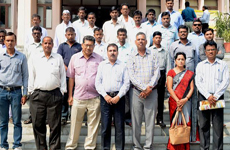The National Centre for Cooperative Education (NCCE) conducted a 5 day Refresher Course on Cooperative Policies and Development for faculties of Indian universities and colleges from 24 – 28 August, 2015 at NCCE, New Delhi in which 55 participants from different universities of states took part. The prime objective of the course was to sensitize participants about current policies and issues of the Indian Cooperative movement and providing them an opportunity for learning through exchange of views and experiences with academicians, bureaucrats, technocrats and cooperative leaders working with national and international institutions.
The Programme was inaugurated by Dr. V.K. Dubey Director NCCE. He said in his inaugural speech that the cooperative movement is playing an important role through its different sectors especially Agriculture, Banking, Consumer, Fisheries, Housing, sugar, fertilizers etc. These sectors have shown a significant progress in recent days. He also stressed that there is a need to introduce professional technology in the training and education and in this direction colleges and universities can take initiatives. During the programme, senior academic experts from different sectors of the cooperative movement held sessions interacting with participants. The participants presented their research papers on various cooperative fields. The participants were provided with the knowledge about functions of cooperatives, management of cooperative organizations, cooperative policies and laws and challenges and issues confronting cooperatives.
Dr. Dinesh delivered the valedictory speech. In his remarks he underlined the importance of the cooperative sector and said about 16% employment is created by cooperative organizations in India. The potential for self employment and income generation is high in the sector. He requested participants as well as professors of universities to make necessary changes in the syllabus on cooperative subjects, keeping in view the vocational and practical aspects, so that students may get attracted towards cooperatives.
He also called for alloting projects and research works to participants for studying cooperative institutions. He suggested participants may be deputed for one or two months in cooperative organizations for practical experiences as well as internship. This would enable students to understand the working of cooperative institutions, he said. Dr. A.R. Srinath, Dy. Director/ Course Coordinator proposed a vote of thanks in the valedictory function.













































